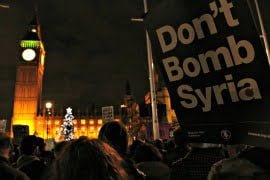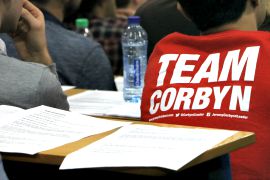The Corbyn movement that began last summer represented the beginning of a political revolution inside the Labour Party. But this transformation is not yet complete. Corbyn has weathered the storm of attacks from the Tory press and the Blairites, emerging stronger in his position as leader; but Labour’s civil war is far from over.
The Corbyn movement that began last summer represented the beginning of a political revolution inside the Labour Party. But this transformation is not yet complete. On the one hand, thanks to his enormous grassroots support, Corbyn has weathered the storm of hysteria and attacks from the Tory press and the Blairites, emerging stronger in his position as leader. On the other hand, however, the right wing of the Labour Party, residing primarily in Westminster, has not been completely routed and continues to skirmish with Corbyn in an attempt to destabilise and discredit him as leader. Corbyn has won many battles thus far; but Labour’s civil war is far from over.
Having dominated the Party for over two decades now, the Blairite wing has been unable to accept Corbyn’s victory and the “new kind of politics” that the left leader represents. Indeed, as the most ardent devotees to the needs of capitalism – consistently attempting to prove their role as reliable statesmen by prostrating themselves before the Establishment at every opportunity – such ladies and gentlemen will never be able to concede defeat to the Corbyn movement.
Any plots to remove Corbyn, however, were quickly scuppered by his tremendous landslide result in the leadership election, and by the flood of Corbyn-supporters into the Labour Party. Conscious of their weak position, the Blairites have instead sought to bide their time, regrouping and fighting a guerrilla war from their stronghold within the Parliamentary Labour Party (PLP).
But such attacks have so far failed to make a dent in the support for the new Labour leader. Indeed, in many cases, vitriolic attacks and mudslinging from the Blairite camp have instead backfired. In their attempts to undermine Corbyn, the Labour right wing has only served to highlight how out of touch they are with both rank-and-file members and wider society alike. Indeed, a YouGov poll from November last year showed that a clear majority of Labour voters blamed right-wing MPs – not Corbyn – for divisions within the Shadow Cabinet.
Test of strength
 A rapid series of events have played a role in putting the Blairites on the back foot and solidifying Corbyn’s leadership. Firstly, strong opposition by Corbyn and his supporters has helped to (temporarily) defeat the Tories on important issues such as tax credit cuts. Secondly, Labour’s victory in the Oldham by-election, where the Labour candidate secured an increase in the vote share for the Party, demonstrated the absurdity of all the doom-and-gloom predictions from the mainstream press, with their accusations that a Corbyn-led Labour Party is “unelectable”.
A rapid series of events have played a role in putting the Blairites on the back foot and solidifying Corbyn’s leadership. Firstly, strong opposition by Corbyn and his supporters has helped to (temporarily) defeat the Tories on important issues such as tax credit cuts. Secondly, Labour’s victory in the Oldham by-election, where the Labour candidate secured an increase in the vote share for the Party, demonstrated the absurdity of all the doom-and-gloom predictions from the mainstream press, with their accusations that a Corbyn-led Labour Party is “unelectable”.
Finally, and most importantly, was the vote over bombing in Syria. Only days before the vote in Parliament, the Tory media was revelling at the prospect of over 100 Labour MPs rebelling against their leader and siding with the Cameron government in their enthusiasm for war. But as the debate progressed and the hour of judgement drew nearer, it was clear that – outside of the Westminster bubble – a groundswell of opposition to the bombing was developing on social media, in local constituencies, and on the streets. A broad movement of Corbyn supporters and anti-war activists put pressure on their political representatives, whilst several surveys (including one initiated by the Labour leader himself) indicated that around 75% of Labour supporters opposed the bombing, forcing many Labour MPs who were sitting on the fence to think-twice about supporting the Tories in the vote for bombing.
In the end, the number of Labour MPs voting for bombing was reduced to 66, and Corbyn secured a majority of support for his anti-war position both within the Shadow Cabinet and the wider PLP. The ramifications of this vote, however, will continue to cast a shadow for some time to come. The “66 warmongers” have rightly earnt the wrath of Labour members, and have now singled themselves out for deselection in the future. Furthermore, the vote has acted as a warning shot across the bows of the so-called “moderates”, demonstrating the potential strength of the army that can be called upon and organised to defend Corbyn and his policies in the event of any intrigues, attacks, or attempted coups by the Blairite Fifth Column that remains within the Labour Party.
Transformation beneath the surface
Even the right-wing press have now been forced to acknowledge Corbyn’s strengthened position as leader – the result of the metamorphosis that is taking place within the Labour Party. “Labour’s problem,” the Economist writes (16th January 2016), from its class perspective as the serious mouthpiece of the ruling class, “is…the fact that its leader is getting stronger. More centrist members are leaving as lefties sign up (over half the party has joined since the election in May). The prospect of a candidate with the infrastructure to beat Mr Corbyn is more remote than ever. Swathes of centrist MPs could lose their seats…”
Elsewhere, the Guardian has recently published the results of its investigations into the changing Labour landscape, highlighting the transformation that is has been quietly taking place on the ground – a transformation that is sinking ever-more solid foundations within the Party for Corbyn’s leadership and programme.
“Jeremy Corbyn’s hopes of remouldingLabour,” Ewen MacAskill reports (13th January 2016), “have been boosted by a detailed Guardian survey into the party at grassroots level that shows overwhelming support for him, a decisive shift to the left and unhappiness with squabbling among MPs.”
The Guardian report indicates how Labour has been rejuvenated by the Corbyn movement, with “a revival of branches that had been moribund for years and close to folding” and a two-to-five-times increase in membership across most constituencies. At a national level, the same article continues, Labour’s membership has almost doubled since the last general election, now standing at a figure of almost 390,000.
Interesting, this incredible growth in membership comes despite an outflow of around 8,500 disgruntled New Labour types, who have quit the Party in protest against Corbyn’s resounding election last September. To add insult to injury for the Blairites in the PLP, already wounded by the meagre 4.5% that their candidate – Liz Kendall – received in the leadership election, the new Corbyn-supporting members are joining at a rate ten times greater than the “moderates” who are leaving.
Tensions increase
 This transformation within the Labour Party, however, is far from complete. On the one hand, those newly politicised and radicalised layers that have actively thrown themselves into the Party – looking to change society and defeat the Tories – are coming up against the stultifying atmosphere and ossified crust that exists within the Party’s structures; a remnant of Labour’s rightward shift and political stagnation under Blair, Brown, and Miliband.
This transformation within the Labour Party, however, is far from complete. On the one hand, those newly politicised and radicalised layers that have actively thrown themselves into the Party – looking to change society and defeat the Tories – are coming up against the stultifying atmosphere and ossified crust that exists within the Party’s structures; a remnant of Labour’s rightward shift and political stagnation under Blair, Brown, and Miliband.
“Some constituencies,” the Guardian article notes, “[are] reporting potential rifts between long-term members used to rule-bound discussions and the younger ones seeking more zest and passion in their politics.” “At some point,” according to Christina Watkins, constituency secretary for Southampton and Romsey CLP, “there is going to be a collision between these older and younger people: those that see this as a return to the old politics and those who see it as a new kind of politics.”
On the other hand, the growth in membership has not yet been universally reflected within the actual structures of the Party. At every level, from wards and constituencies, through to the PLP and the Party apparatus, it is clear that the right-wing Labour establishment is seeking to maintain a bureaucratic grip on the Party. Many of the local branch secretaries and chairs are still a reflection of the past; not to mention the councillors and – most obviously – the MPs.
The Labour leader has commendably survived months of endless attacks, both from a hostile press and a cabal of uncooperative colleagues. Now he is beginning to put the pieces in place for the battles that clearly lie ahead, most notably on the question of Trident, with Maria Eagle – a firm supporter of maintaining Britain’s nuclear arsenal – replaced by the anti-Trident (although not particularly pro-Corbyn) MP for Islington South, Emily Thornberry, as Shadow Secretary for Defence. Meanwhile, Hilary Benn has had his wings clipped as Foreign Secretary, following his outspoken support for bombing in Syria, and has been told he must support Corbyn’s position on issues of foreign policy.
Despite its mildness, Corbyn’s shadow cabinet reshuffle was nevertheless received with a hysterical response from the right-wing press and the Blairites. In a vain attempt to destabilise Corbyn, Catherine McKinnell, the Shadow Attorney General, resigned from the Labour frontbench, whilst three junior shadow ministers stood down in what was clearly a co-ordinated – but ultimately underwhelming – attempt to undermine the Labour leader.
Indeed, even the so-called “neutral” media themselves have been involved in these machinations, with the BBC’s Political Editor, Laura Kuenssberg, being accused by Corbyn’s director of communications, the left-wing journalist Seamus Milne, of deliberating attempting to damage Corbyn’s leadership and aid the Tories by persuading one of the three junior shadow ministers to resign live on the BBC’s Daily Politics show, shortly before Prime Ministers’ Questions.
In the end, even this orchestrated campaign against Corbyn by all the various pillars of the Establishment was received with nothing more than a whimper, again demonstrating both Corbyn’s growing strength and the weakness of the Blairites on the ground, due to their lack of any real roots within either the Party or society in general.
Complete the Corbyn revolution!
 Whilst Corbyn has proved his position to be more secure than the Labour right wing and the ruling class were initially hoping for, in truth, this modicum of stability has come partially as a result of compromise with those Labour MPs who do not back him or his programme. For example, the reality is that Corbyn’s reshuffle did not go far enough. The Shadow Cabinet remains full of those who do not genuinely support Labour’s left-wing leader and the policies he stands for, including prominent Blairites such as Lord Falconer and Hilary Benn.
Whilst Corbyn has proved his position to be more secure than the Labour right wing and the ruling class were initially hoping for, in truth, this modicum of stability has come partially as a result of compromise with those Labour MPs who do not back him or his programme. For example, the reality is that Corbyn’s reshuffle did not go far enough. The Shadow Cabinet remains full of those who do not genuinely support Labour’s left-wing leader and the policies he stands for, including prominent Blairites such as Lord Falconer and Hilary Benn.
Above all, the Parliamentary Labour Party needs to be brought into line with the wishes and desires of the rank-and-file, who overwhelming support Corbyn and his left-wing programme. As demonstrated by the Syria vote, there is still a bastion of Blairites who – despite all the pressure from below – refuse to listen to the voices of the ordinary people they are supposed to represent, instead acting as nothing but marionettes for the ruling class. These careerist creatures must go.
In this respect, the Corbyn revolution needs to be carried to its logical conclusion. Whilst the Guardian survey indicates that there is “little interest at constituency level in deselection”, it is clear that the question is at the forefront of everyone’s minds, hanging like the Sword of Damocles over the heads of those right-wing MPs who refuse to back Corbyn and the desire for a fundamental change that he represents.
Not only has the Syria vote highlighted the antagonisms that still exist within the Labour Party and made deselection a burning issue, but – as the Guardian highlights (15th January 2016) in relation to the case of Stoke-on-Trent, home of the highly-unpopular parachuted Labour MP, Tristram Hunt – the upcoming boundary changes being pushed through by Cameron and the Tories mean that question of selecting new parliamentary Labour candidates will be posed point blank in the next few years, regardless of the desires by Corbyn, Momentum, and others to ignore this elephant in the room for the sake of “calm” and “unity”. All it would take is one prominent case of deselection, and the whole situation could take on a logic of its own, spreading like wildfire across the Labour movement.
Defend Corbyn! Fight for Socialism!
 Needless to say, the Blairites would not tolerate any threat to their Westminster careers. They consider themselves to have a divine right within the Labour Party to do and say as they please, regardless of the will of the membership, and they would rather see Labour lose and Corbyn deposed than allow the Party to come fully under the control of the Corbyn movement. For these professional politicians, it is a question of rule or ruin.
Needless to say, the Blairites would not tolerate any threat to their Westminster careers. They consider themselves to have a divine right within the Labour Party to do and say as they please, regardless of the will of the membership, and they would rather see Labour lose and Corbyn deposed than allow the Party to come fully under the control of the Corbyn movement. For these professional politicians, it is a question of rule or ruin.
Simon Danczuk, Labour MP for Rochdale and one of the most prominent of Corbyn’s critics, has been silenced for the time being, following his suspension over allegations of scandal and sleaze; but dozens of other right-wing Labour MPs remain hiding in the shadows, ready to stick the knife in when the time is right.
The more sober-headed voices of the ruling class are openly admitting that Labour is, in reality, two different parties within one: a party of the past, of New Labour acolytes and so-called “moderates” who represent the interests of big business and the 1%; and a party of the future, of Corbyn and his supporters who represent the desire for change felt by the mass of ordinary people. Leading Blairite figures are even advocating a split.
The period ahead will be the most turbulent and volatile in history, with crisis at every level: economically, socially, and politically. Faced with a new world slump, which is already on the horizon, the Tories will be forced to carry out years of austerity, cutting to the very bone of British society. With Cameron and the Conservatives facing their own internal crisis, the ruling class will be increasingly forced to rely on the Labour Party to hold up the system. Hence the calls emanating already from some quarters of the bourgeois press, such as the Economist, who openly suggest using the “nuclear option”, as they call it: for “moderate [read: right-wing Labour] MPs to declare independence from Mr Corbyn and sit as a separate group in the Commons.”
It is time for Corbyn to openly recognise and acknowledge what the serious strategists of capitalism have already concluded long ago: there can be no unity between the antagonistic interests of the bosses, represented by the Blairite cabal inside the PLP, and the aspirations of workers and youth, represented by the Corbyn movement. Only when Labour is led at all levels by those willing to support Corbyn in opposing war and austerity can there be genuine unity. Only then can Labour launch the fightback that is needed against the Tories, and for a socialist alternative.






